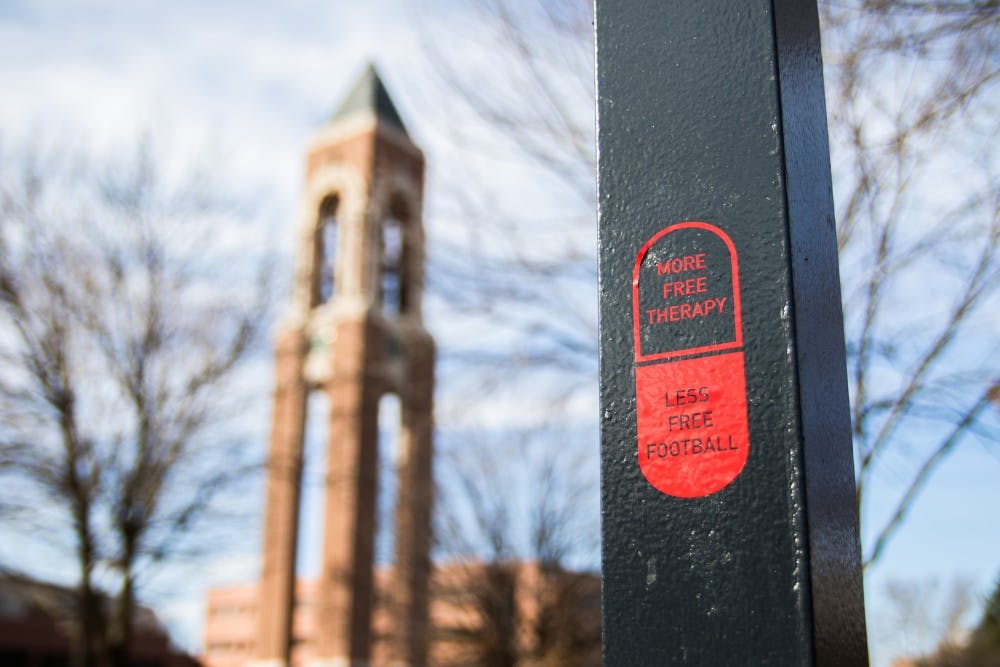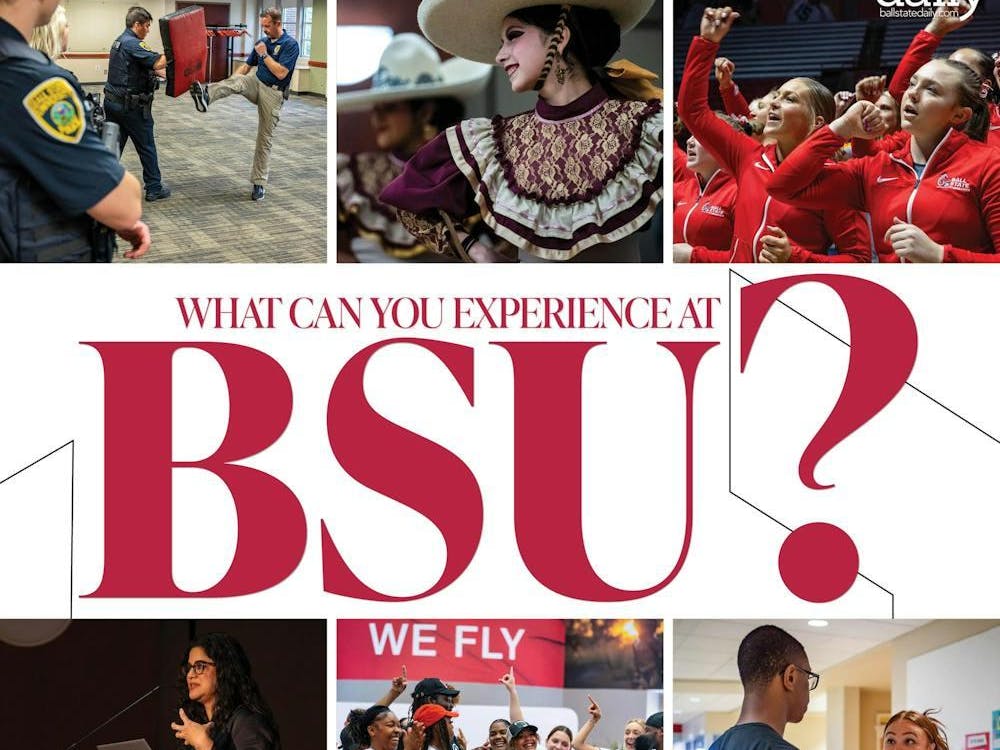The "More Free Therapy, Less Free Football" slogan sticker has a deeper message than some may think as they walk past the multiple posts across campus.
For creator Nikki Abel, it was a way to promote dialogue and spread awareness about the issue of mental health and availability of services of the Counseling Center to students who need it.
After reading an article published in the Ball Bearings magazine that explained where the university money is prioritized, the visual communication major and her roommate Savannah Cousins, a senior lighting design and directing major, realized there was a problem.
"I saw a blatant lack of funding through that article,” Abel said. "The whole issue is when we have free access to so many games and so many unnecessary things ... I'm not saying the student services fee that goes toward Late Nite and free movies weekly is an 'evil' thing, I'm just saying the funding is definitely prioritized. When we go back to this 'gladiator'-style sense of worship of sports, it's not healthy for a society, it's not healthy for people to think therapy is invalid or not worth the time. "
From there, Cousins came up with the phrase "More Free Therapy, Less Free Football," which stuck with Abel and turned into what she said was “something bigger than herself.”
With a vinyl cutter at her fingertips, she began creating stickers that look like pills with her slogan and posted them around a variety of areas on campus anonymously.
“Any other shape would not have been as effective at communicating the message,” Abel said. “Prescribing medication is definitely a Western mindset toward healing that I don't necessarily agree with, but it does provide a universally known symbol.”
The lack of therapy for students isn’t just an issue to Ball State. It is a nationwide problem as the demand for mental health services at colleges continues to increase along with the reality of being underfunded.
“We are witnessing students who are voicing their mental health issues in larger numbers than before across college campuses,” said Jagdish Khubchandani, an associate professor of health science. “Colleges are not prepared for this new and emerging wave of greater number of cases of mental health problems."
In the past, Ball State’s Counseling Center has received backlash for not being able to meet the demands of students.
The center announced on Dec. 1, 2016 that it was no longer accepting new patients until January 2017. This was due to large increase in student population, resulting in a 14 percent increase of services.
The Counseling Center houses seven full-time therapists, one staff counselor, three full-time doctoral interns and 14 part-time graduate students. It schedules a month out for a new appointment and current clients are typically seen every other week, Ellen Lucas, associate director of outreach consulting psychology for the Counseling Center, told The Daily News in a past story.
The Counseling Center has provided alternative solutions to help meet students needs.
In addition to pushing group therapy initiative versus one-on-one therapy with students this semester, the center also provides the WellTrack program, Concerned Charlie, an online advice column and a relaxation and resource room that houses two massage chairs to use free of charge with no appointment necessary, books and information covering a wide variety of mental health issues.
Recently, the Board of Trustees announced the university would provide off-campus resources for employees so the Counseling Center would be specifically for students and their needs.
The reality is that universities are not legally bound to provide counseling services for students at all, Khubchandani said.
“A majority of the college counseling centers in the U.S. maintain a right to deny treatment of a student if their mental health needs exceed the center’s treatment resources,” Khubchandani said in a past Daily News article. “Universities nationwide are reconsidering their role and using strategies to manage caseloads and deal with funding and staffing challenges.”
After all of the attention the stickers had been receiving, about a week ago, Abel confessed on Facebook that she was the anonymous person who had posted the pill-shaped stickers around campus. After unmasking herself Feb. 3, her Facebook was flooded with comments of gratitude, a little criticism and hundreds of share and likes.
The stickers also caught the attention of the university.
Via email, Abel was sent a cease and desist letter urging her to stop selling, distributing and applying stickers. She later had a meeting with Michael Gillian, director of student rights and community standards. Gillian explained that her actions were vandalism, which is classified as the offense that Abel violated, probing the university to issue the letter. The stickers are made of vinyl, which is plastic that can be easily removed from a surface but will damage others surfaces such as plexiglass.
"I have a lot of respect for the man who talked to me and I realized how I didn't think about how my actions reflected on other people," she said.
Even though Abel herself receives services from the Counseling Center and said she has been “happy so far,” she still plans to keep advocating for students and hopes to bring change to the university and stigmatization of mental health.
"Nikki is doing something unique," Khubchandani said. "This is what we teach in community health classes. We need more citizen advocates who can bring about change."
To learn more about Abel's work and purchase a sticker go to www.abelminded.com.





